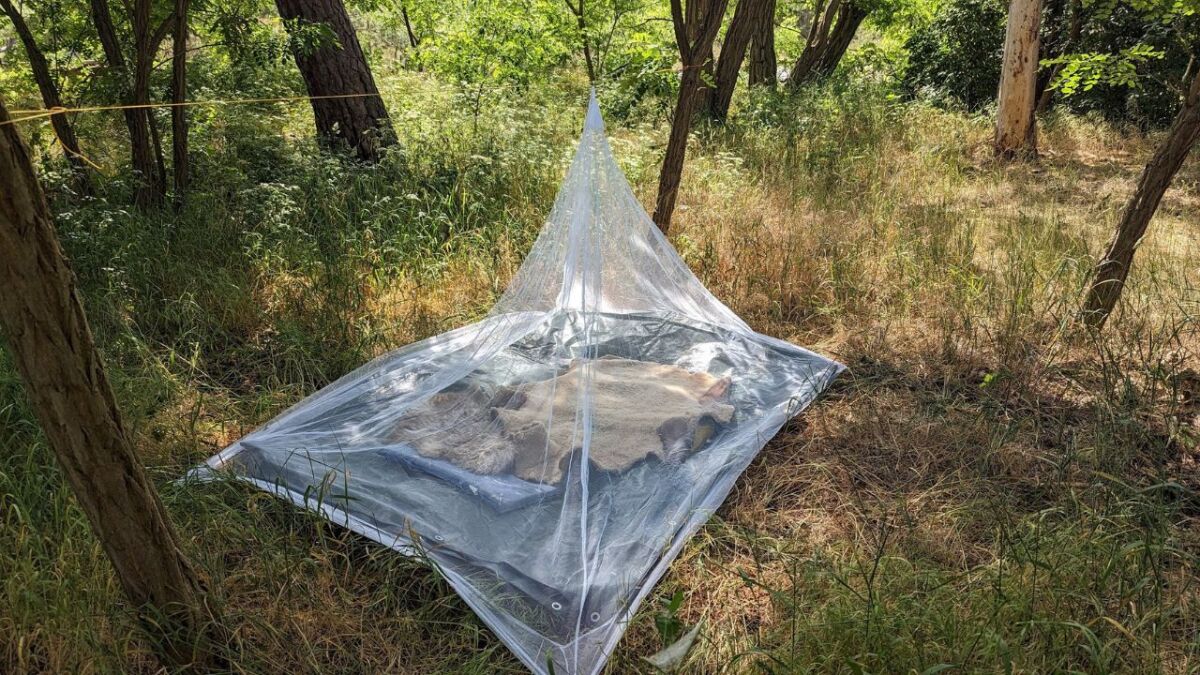
mosquito net
Noun
Meaning
A mosquito net is a protective barrier made of fine mesh fabric that is used to keep mosquitoes and other insects away while sleeping or resting in outdoor environments. It is an essential piece of equipment for anyone engaging in activities such as camping, hiking, or survival in areas where mosquitoes are prevalent.
Mosquito nets are designed to be lightweight, portable, and easy to set up. They are typically hung over a bed or sleeping area, creating a physical barrier that prevents mosquitoes from reaching the person inside. This helps to reduce the risk of mosquito-borne diseases such as malaria, dengue fever, and Zika virus.
Using a mosquito net is a simple and effective way to protect yourself from insect bites and ensure a more comfortable and safe outdoor experience.

Examples
„I love camping in the summer, but those pesky mosquitoes always ruin the experience. That's why I always bring my mosquito net with me. It keeps those annoying bugs away while I sleep peacefully under the stars.“
„During my last hiking trip, I met a fellow adventurer who had forgotten to bring a mosquito net. Needless to say, he regretted it when he woke up covered in mosquito bites.“
„When I go on expeditions to tropical rainforests, a mosquito net is an absolute must-have. It provides a protective barrier against disease-carrying mosquitoes, allowing me to explore the wilderness without worrying about getting bitten.“
„My friend recently went on a camping trip with her family and used a mosquito net to protect her baby from mosquito bites. It gave her peace of mind knowing that her little one was safe from those pesky insects.“
„I remember one time when I was camping near a lake, and the mosquitoes were relentless. Thankfully, I had my trusty mosquito net set up around my hammock, creating a bug-free sanctuary for me to relax and enjoy nature.“
Origin
The word "mosquito net" originates from the combination of two words: "mosquito" and "net".
The term "mosquito" comes from the Spanish and Portuguese word "mosquito", which means "little fly". It was first used in English in the late 16th century to refer to the small, blood-sucking insects that are known for their irritating bites.
The word "net" has Old English roots and refers to a fabric or mesh material made by weaving threads together. Nets have been used for various purposes throughout history, including fishing, hunting, and protection.
The concept of using nets to protect against mosquitoes and other insects dates back centuries. In tropical and subtropical regions where mosquitoes are prevalent, people have long recognized the need for a barrier to keep these pests away while sleeping or resting.
Mosquito nets have evolved over time, with different materials and designs being used to improve their effectiveness and convenience. Traditional mosquito nets were made from natural fibers like cotton or silk, while modern versions are often made from synthetic materials like polyester.
Today, mosquito nets are widely used in areas where mosquito-borne diseases like malaria are prevalent. They are an essential tool for outdoor enthusiasts, travelers, and those living in mosquito-infested regions, providing a protective barrier against mosquito bites and the diseases they can transmit.
Synonyms
Insect screen, Bug net, Mosquito mesh, Fly net, Mosquito curtain, Insect netting, Bug screen, Fly curtain
Antonyms
Open air, Unprotected, Exposed, Vulnerable, Unshielded, Unguarded, Defenseless, Susceptible
Relatives
Insect repellent, Camping, Outdoor, Hiking, Camping gear, Bug spray, Camping equipment, Outdoor adventure
Historical and cultural importance
Mosquito nets have a long history of cultural and historical significance, particularly in regions where mosquitoes and the diseases they carry are prevalent. These nets have been used for centuries as a means of protection against mosquito bites and the transmission of diseases such as malaria, dengue fever, and Zika virus.
In many cultures, mosquito nets have become an integral part of daily life, especially in tropical and subtropical regions. They are often used as a primary defense against mosquitoes, providing a physical barrier between humans and the insects. Mosquito nets are commonly used in sleeping areas, both indoors and outdoors, to create a safe and protected space for rest and relaxation.
Historically, mosquito nets have played a crucial role in public health initiatives aimed at reducing the spread of mosquito-borne diseases. Organizations such as the World Health Organization (WHO) have promoted the widespread use of mosquito nets as an effective and affordable method of disease prevention.
Furthermore, mosquito nets have also become a symbol of humanitarian efforts and global health initiatives. Many non-profit organizations and government agencies distribute mosquito nets to vulnerable populations in developing countries, helping to protect individuals and communities from the devastating impact of mosquito-borne diseases.
Overall, mosquito nets have a rich cultural and historical significance, representing both a practical solution for personal protection and a symbol of global efforts to combat mosquito-borne diseases.
More information about the term mosquito net
Mosquito Net: A Must-Have for Outdoor Enthusiasts
When it comes to spending time in the great outdoors, there's nothing quite as annoying as being constantly bothered by mosquitoes and other pesky insects. That's where a mosquito net comes in handy. This essential piece of gear is a must-have for any outdoor enthusiast, whether you're camping, hiking, or simply enjoying a day in the park.
Protection from Mosquitoes and Other Insects
A mosquito net is designed to provide you with protection from mosquitoes and other insects while allowing you to enjoy the fresh air and beautiful surroundings. It is typically made from a fine mesh material that is small enough to keep even the tiniest bugs out. By creating a physical barrier between you and the insects, a mosquito net helps to prevent bites and the potential transmission of diseases such as malaria, dengue fever, and Zika virus.
Whether you're sleeping in a tent, hammock, or under the stars, a mosquito net can be easily set up to provide you with a bug-free zone. It can be hung from trees, poles, or even attached to your camping gear. With its lightweight and compact design, it's easy to carry and doesn't take up much space in your backpack.
Comfort and Peaceful Sleep
One of the biggest advantages of using a mosquito net is the comfort it provides. Instead of spending your nights swatting away mosquitoes and other insects, you can enjoy a peaceful and uninterrupted sleep. This is especially important in areas where mosquitoes are prevalent or during the summer months when they are most active.
Not only does a mosquito net keep bugs away, but it also allows for better airflow and ventilation. This helps to keep you cool and comfortable, even on hot and humid nights. You can rest easy knowing that you won't wake up covered in itchy mosquito bites.
Versatility and Easy Maintenance
Mosquito nets come in various shapes and sizes to suit different needs. You can find single or double-sized nets, as well as ones that are specifically designed for hammocks or baby cribs. Some nets even come with built-in frames or poles for added convenience.
When it comes to maintenance, mosquito nets are relatively easy to care for. Most nets are machine washable, making it simple to keep them clean and free from dirt and debris. It's important to follow the manufacturer's instructions for washing and storing the net to ensure its longevity.
Conclusion
A mosquito net is an essential piece of gear for any outdoor enthusiast. It provides protection from mosquitoes and other insects, allowing you to enjoy your time in nature without the annoyance of bug bites. With its comfort, versatility, and easy maintenance, a mosquito net is a must-have item for anyone who loves spending time in the great outdoors.
Back to overview

